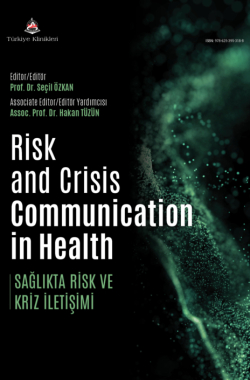Crisis Communication Frameworks and Models: Approach with an Intercultural Communication Dimension
E. Nezih ORHONa
aAnadolu University Faculty of Communication Sciences, Eskişehir, Türkiye
Orhon EN. Crisis communication frameworks and models: Approach with an intercultural communication dimension. In: Özkan S, ed. Risk and Crisis Communication in Health. 1st ed. Ankara: Türkiye Klinikleri; 2024. p.17-22.
ABSTRACT
The common approaches that needs to be followed and planned in different processes in crises are often based on generally determined principles. When it comes to crisis-related communication, many variables come into play, as people are at the center and are involved in different cultural variables and contexts. It is a necessity to approach crisis communication with certain models and frameworks and models, taking into account different intercultural dimensions. The aspect of cultural diversity and cultural variables is as important as the structuring of a crisis communication and the principles of intervention.
Keywords: Crisis communication; intercultural; communication; health
Kaynak Göster
Referanslar
- Young M. The community crisis response team training manual. 2nd ed. Washington, DC: National Organization for Victim Assistance; 1998. p.7.
- NATO Civil Preparedness Civil Protection Group. A Practical Guide to Public Information during a Crisis (Budapest Guidelines III). Year Not Given. p.7
- Hobfoll S, et al. Five Essential Elements of Immediate and Mid-Term Mass Trauma Intervention: Empirical Evidence. Psychiatry. 2007;70(4). [Crossref] [PubMed]
- Tseng WS, Streltzer JM. Cultural Competence in Health Care New York, NY: Springer; 2008. p.1. [Crossref]
- Dutta MJ. Foreword. In: Amiso MG, Kwamena KA, eds. Culture and Crisis Communication: Transboundary Cases from Nonwestern Perspectives. Hoboken, New Jersey: IEEE Press, John Wiley & Sons, Inc.; 2017. p.xxiv.
- Knox C, Haupt B. Cultural Competency for Emergency and Crisis Management: Concepts, Theories and Case Studies. New York, NY: Routledge; 2020. [Crossref]
- Reynolds B, Seeger M. Crisis and Emergency Risk Communication. U.S. Department of Health and Human Services. Centers for Disease Control and Prevention; 2014. p.61-2; p.6
- Kwansah-Aidoo K, George AM. Communication, Culture and Crisis in a Transboundary Context. Culture and Crisis Communication: Transboundary Cases from Nonwestern Perspectives. Hoboken, New Jersey: John Wiley & Sons, Inc.; 2017. p.7. [Crossref]
- Regina EL, McMakin AH. Risk Communication: A Handbook for Communicating Environmental, Safety, and Health Risks. 5th ed. The Institute of Electrical and Electronics Engineers. Inc., John Wiley & Sons; 2013. p.114.
- Quilty D. Effective crisis communication starts with this. [Internet]. December 7, 2022. [Access: 10 March 2023]. Link: [Link]
- Delmo, K., McDonald, M., Krikowa, N., Vuong, I., Cultural Competence in Emergency and Disaster Preparedness for Multicultural Community Engagement: Identifying Gaps in the Australian Context. [Internet] 12 September 2023. [Access: 28 February 2023]. [Crossref] [PubMed]
- Campinha-Bacote J. The Process of Cultural Competence in the Delivery of Healthcare Services: A Model of Care. Journal of Transcultural Nursing. 2002;13(3):181-2. [Crossref] [PubMed]
- Ferdinand KC. Overcoming Barriers to COVID-19 Vaccination in African Americans: The Need for Cultural Humility. American Journal of Public Health. 2021;111(4):586-88. [Crossref] [PubMed] [PMC]
- Winters Group. Cultural competence model. [Access: 5 June 2024]. [Link]
- Cheung FM, van de Vijver FJR, Leong FTL. Toward a new approach to the study of personality in culture. American Psychologist. 2011;66:593-603. [Crossref] [PubMed]
- Christine R, Sirles D, Hardin EE. Cognitive Constructs in the Context of Positive Psychology. In: Pedrotti JT, Edwards LM, eds. Chapter: Perspectives on the Intersection of Multiculturalism and Positive Psychology, Cross-Cultural Advancements in Positive Psychology. 2014;7:75-91. [Crossref]
- Jongen C, et al. Cultural Competence in Health, SpringerBriefs in Public Health, [Internet] 2018. [Access: 22 February 2024]. [Crossref]

